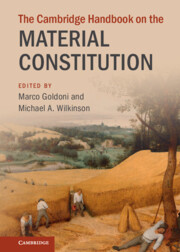Book contents
- The Cambridge Handbook on the Material Constitution
- The Cambridge Handbook on the Material Constitution
- Copyright page
- Contents
- Contributors
- Introduction
- Part I History
- 1 The Tradition of the Material Constitution in Western Marxism
- 2 The Soul of the State
- 3 Laski’s Materialist Analysis of the British Constitution
- 4 Rudolf Smend’s Legacy in German Constitutional Theory
- 5 The Constitution in the Material Sense According to Costantino Mortati
- 6 The Material Constitution of the Dual State
- 7 ‘A Certain Shadowy Totality’
- 8 The Material Constitution in Greek Constitutional Thought
- 9 The Constitution As Social Compromise
- 10 ‘Self-Justifying Law of Constitutional Law’
- Part II Challenges
- Part III Analyses
- Index
10 - ‘Self-Justifying Law of Constitutional Law’
The Material Constitution in Rudolf Wiethölter’s Critical Systems Theory
from Part I - History
Published online by Cambridge University Press: 15 January 2023
- The Cambridge Handbook on the Material Constitution
- The Cambridge Handbook on the Material Constitution
- Copyright page
- Contents
- Contributors
- Introduction
- Part I History
- 1 The Tradition of the Material Constitution in Western Marxism
- 2 The Soul of the State
- 3 Laski’s Materialist Analysis of the British Constitution
- 4 Rudolf Smend’s Legacy in German Constitutional Theory
- 5 The Constitution in the Material Sense According to Costantino Mortati
- 6 The Material Constitution of the Dual State
- 7 ‘A Certain Shadowy Totality’
- 8 The Material Constitution in Greek Constitutional Thought
- 9 The Constitution As Social Compromise
- 10 ‘Self-Justifying Law of Constitutional Law’
- Part II Challenges
- Part III Analyses
- Index
Summary
Looking for orientation, it is worthwhile to reconstruct the intellectual trajectory of Rudolf Wiethölter, a radical legal scholar from the Frankfurt school of critical theory. Wiethölter reacts to the disaster of both current liberal and Marxist legal theories. He has the courage to lay out the blueprint for a constitutional utopia. Two distinct phases are discernible. In the first phase, he develops the program of a material constitution – the economic constitution as the constitution of society. In the second phase, after his long march through the three most advanced social theories of modernity, he develops a ’critical systems theory of law’, which, however, he sharply positions against Niklas Luhmann’s functionalist systems theory. Selbstgerechtes Rechtsverfassungsrecht (self-justifying law of constitutional law) – in this condensed formula Wiethölter enigmatises his vision of a future material constitution. No less enigmatic are its two main elements of a novel ’reciprocity’ and an ’impartial partiality’. How can these enigmatic concepts be deciphered? And what prospects do they open up to an ambitious constitutional program?
- Type
- Chapter
- Information
- The Cambridge Handbook on the Material Constitution , pp. 150 - 168Publisher: Cambridge University PressPrint publication year: 2023
- 1
- Cited by

